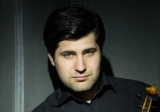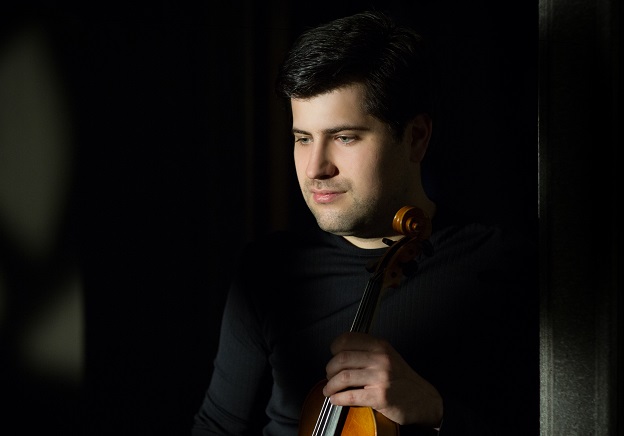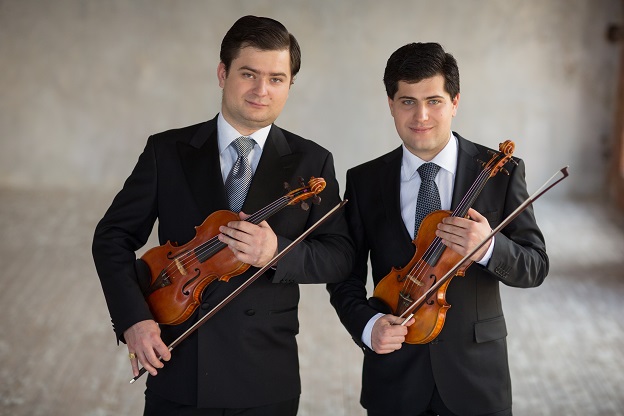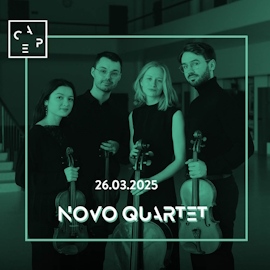When I first met Mikhail Pochekin back at the beginning of 2018 in Madrid, I immediately knew there was something special about him. It was not only his amazing playing – I had the chance to see him play at Fundación Juan March accompanied by Yuri Favorin, an incredible Russian pianist – but also the way he understands music and life. Mikhail Pochekin is an exceptional violinist, but even more important than that: a real musician. Three years ago, he recorded the Six Sonatas & Partitas of Johann Sebastian Bach for the label Solo Musica, one of the landmarks for any violinist who is worth their salt. Mikhail Pochekin’s recording of Bach was fantastic and, to me, one of the reference recordings along with Thomas Zehetmair or Isabelle Faust. Recently he has recorded a new CD which has been just released on the label Hänssler Classics. On this occasion the composer of his choice is Mozart. If you haven’t listened to it yet, you should. A great rendition of Sinfonia Concertante – Mikhail plays it with his brother Ivan on the viola – and a superb Concerto no. 5 for violin along with the Stuttgarter Kammerorchester.
What’s the role of a performer nowadays?
This is my personal point of view, but I believe that with the onset of the pandemic, many people from a wide variety of professions have become more acutely aware of what is really dear to them and what they especially lack in conditions of pandemic restrictions. Therefore, on the one hand, the audience realized how important concert attendance is in their lives. And on the other hand, the performers (especially freelancers) in these terribly difficult conditions have the opportunity to realize: is the music really something that we cannot live without or we could find ourselves something else to do? I think, based on this, we all, as listeners and performers, can really think and find for ourselves the personal answer to your question.
Where do you feel more comfortable, more yourself or at ease, as a soloist or as a chamber musician?
To be honest, I love, appreciate and respect the versatility of musicians, and I strive for this myself. After all, having a violin in your hands, you can play so much genius music in completely different formations! I think that this kind of openness is one of the most important qualities of a musician. I can say the same for performance on historical instruments, for example. This certainly opens a window into the world of the very interesting musical possibilities, and there you can find a huge number of amazing pieces of composers that are almost never performed.
When did you know you really wanted to become a violin player?
I come from a very violinistic family, so as long as I can remember myself, I remember the violin as well. I think that at the age of 10 I fell in love with the violin, and from that moment I never had a thought to leave it.
You play with your brother Ivan quite a lot. To what extent has he influenced your playing or vice versa?
Yes, we have been performing together since 2011. In 2017 we recorded our debut duo CD, and recently we recorded Mozart’s Sinfonia Concertante together with the Stuttgarter Kammerorchester. Considering that we are two completely different musicians, I think that we certainly influence each other while playing music. And our musical result, that’s what the audience can hear, is probably somewhere between us in the middle.
Why still play Mozart in the 21st Century? Isn’t there any good contemporary music?
Yes, now everyone talks a lot about contemporary music, it’s like a trend. But I believe that all this should be more natural and self-evident.
I am sure that at their time Bach, Mozart or Beethoven didn’t think that they were contemporary composers, and the performers and concert organizers did not choose their pieces in order to support contemporary composers.
They were great people, and their music reflected the spirit and mood of their time.
I don’t like to divide music into ‘contemporary’ and ‘non-contemporary’, but rather use for myself definitions like ‘eternal’ or ‘temporary’.
For example, I remember how a few years ago Ivan and I performed Penderecki’s Concerto Doppio for violin and viola. This great piece was written recently in 2012, but I’m very sure that the people will perform it in 100 and in 200 years. The same thing happens with Mozart’s Sinfonia Concertante, this work is in the plane of eternity, so for me it seems that it will always remain contemporary.
Will you ever record Penderecki’s Concerto Doppio?
We don’t have a concrete plan yet, but this is definitely one of those pieces that I would like to record together with Ivan in my life.
Coming back to your Mozart CD, which challenges did you face during the recording?
We recorded this disc in December 2020 at the Musikhalle in Ludwigsburg. Of course, due to the pandemic, this was a special project. Could we ever imagine before that all musicians would maintain a social distance of several meters?
In addition to the Sinfonia Concertante, I also recorded the Mozart’s Fifth Violin Concerto.
And if in the Sinfonia Concertante Mozart himself wrote cadenzas for solo instruments, then in the fifth concerto I tried many different options. Finally, I choose the cadenzas by Robert Levin. They are amazing, and I think that stylistically they are absolutely in harmony with the concerto.
Talking about written cadenzas, don’t you think the art of improvisation has been lost nowadays?
It is true that in the days of Mozart, also in baroque era, the art of improvisation was extremely developed, and nowadays not all modern performers can own it. Still, one cannot say that now it has been lost. In our time there are great masters of this art, and I really love to listen to them – Andreas Staier, Andrea Marcon, Ton Koopman or the same Robert Levin.
Have ever considered writing music yourself?
Unfortunately, I don’t have that kind of talent. Although, several years ago I made an arrangement for a solo violin of the wonderful piece by Isaac Albeniz, Asturias.
I remember hearing it performed by the great guitarist Andres Segovia, and somehow immediately felt that this piece would sound great on a violin. But this is still my only achievement in this area.
Finally, what kind of message would you like people to take from your last CD?
Today there are many opinions and views on how Mozart’s violin concertos should be performed. And of course, I’m sure we need to be very respectful with the original score, the urtext. But still, for me the most important thing in this music is to convey with the sound its beauty, the dramatic, the operatic side. Then it becomes an expressive musical language. I hope that the audience will feel and hear this in our new CD.
























